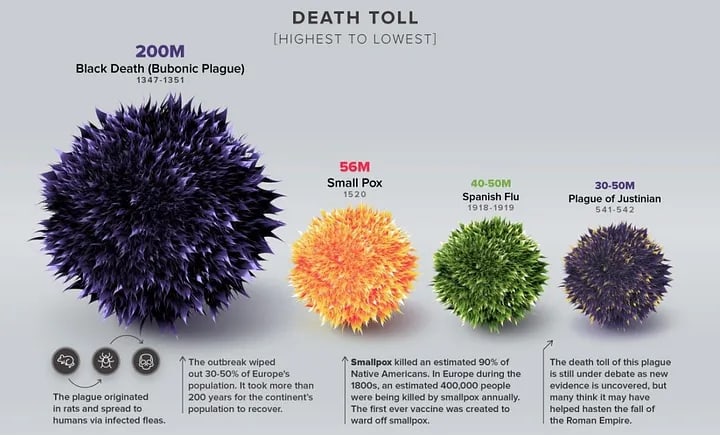Global Health and Pandemics: The Importance of Preparedness and Response
The History of Pandemics,Factors Contributing to Pandemics,Spread of Diseases,Mental Health Effects,Economic Impact.

Global Health and Pandemics: The Importance of Preparedness and Response
Global health refers to the study and practice of improving health and achieving equity in health for all people worldwide. The world has seen various pandemics in the past, and the COVID-19 pandemic has brought global health to the forefront of people’s minds. In this article, we will discuss the importance of global health during pandemics, their impact on global health, and the global health responses to pandemics.

History of Pandemics
Throughout history, there have been several pandemics that have had significant impacts on global health. The Spanish Flu pandemic of 1918 is estimated to have infected 500 million people worldwide and caused the deaths of between 50 million and 100 million people. The HIV/AIDS pandemic has infected more than 70 million people worldwide and caused the deaths of over 35 million people. Ebola outbreaks in Africa have killed thousands of people since the first outbreak in 1976. The COVID-19 pandemic, which began in late 2019, has infected over 200 million people and caused over 4 million deaths worldwide.

Factors Contributing to Pandemics
Several factors contribute to the emergence and spread of pandemics. Environmental factors, such as climate change and deforestation, can lead to the emergence of new infectious diseases. Global travel and trade can rapidly spread infectious diseases across borders. Animal-to-human transmission of infectious diseases, such as the COVID-19 virus, can occur when humans come into contact with infected animals. Lack of preparedness, including insufficient resources, weak health systems, and inadequate surveillance systems, can exacerbate the spread of pandemics.

The Impact of Pandemics on Global Health
Pandemics have a profound impact on global health, and their effects can last for years. In this section, we will explore the ways in which pandemics can affect public health and healthcare systems.
Spread of Diseases
One of the most obvious impacts of pandemics on global health is the spread of disease. Pandemics often spread rapidly across international borders, making them a global concern. With modern transportation, diseases can quickly travel across continents, making it difficult to contain outbreaks.

Strain on Healthcare Systems
Pandemics can also place a significant strain on healthcare systems. As the number of patients with a disease increases, hospitals and clinics become overwhelmed. This can lead to shortages of medical supplies and equipment, as well as staff shortages due to illness.

Economic Impact
Pandemics can also have a significant economic impact, affecting everything from local businesses to international trade. During a pandemic, many businesses are forced to close, leading to job losses and a decline in economic activity. The tourism industry is often hit particularly hard, as people are reluctant to travel for fear of contracting the disease.

Mental Health Effects
Pandemics can also have a significant impact on mental health. Fear, anxiety, and stress are common during pandemics, and the isolation and quarantine measures that are put in place can exacerbate these feelings. Social distancing can lead to feelings of loneliness and depression, particularly in those who are already vulnerable.

Global Cooperation
Finally, pandemics can highlight the importance of global cooperation. No single country can tackle a pandemic on its own, and international cooperation is essential to mitigate its impact. This includes sharing information, coordinating responses, and providing resources to countries that need them.

Conclusion
In conclusion, pandemics have a significant impact on global health, affecting everything from the spread of disease to mental health. By understanding the ways in which pandemics can impact health and healthcare systems, we can better prepare for future outbreaks. It is also essential to recognize the importance of global cooperation in tackling pandemics.

FAQs
What is a pandemic?
A pandemic is an outbreak of a disease that occurs over a wide geographic area and affects an exceptionally high proportion of the population.
What is the difference between an epidemic and a pandemic?
An epidemic is an outbreak of a disease that affects a large number of people within a community or region. A pandemic is an epidemic that has spread over a wide geographic area, usually affecting multiple countries or continents.
What are some of the most common infectious diseases that can cause pandemics?
Some of the most common infectious diseases that can cause pandemics include influenza, Ebola, and COVID-19.
How can I protect myself and my community from pandemics?
You can protect yourself and your community from pandemics by practicing good hygiene, getting vaccinated, staying informed, and following public health guidelines.
What role does international cooperation play in preventing and responding to pandemics?
International cooperation is essential to preventing and responding to pandemics. This includes sharing information, providing technical support, and working together to develop vaccines and treatments.





Comments
There are no comments for this story
Be the first to respond and start the conversation.